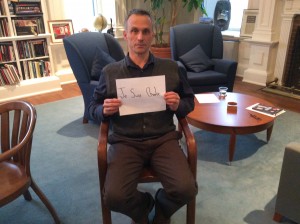This morning the Washington Post published the op-ed below in Valerie Strauss’s education blog, The Answer Sheet. I reproduce it here.
It would be hard to find a period in peacetime when our government has made a more concerted effort to undermine freedom of inquiry and expression. These attacks start with the press and extend to education. Every week President Trump takes aim at journalists, calling them enemies of the people, or deriding sources he dislikes as “fake news.” As many have documented, his administration has engaged in an assault on the very notions of investigation and truth, doubling down on lies about Russian cyberattacks, economic markets and tariffs, and his own past behavior.
Along with attacks on the press have come attacks on colleges and universities. The link between them is the idea of being politically correct. President Trump made political correctness his personal bogeyman, so that when challenged about any variety of salacious improprieties, he would respond that he didn’t have time to be politically correct, or, put more stridently, “political correctness is killing our country.”
Last week Attorney General Jeff Sessions joined the gratuitous, overheated criticism of higher education — which remains one of the sectors of American culture and economy that has continued to attract respect and engagement from the best and brightest from around the world. Participating in the pile-on culture he claims to deride, Sessions attacked the usual caricatures in his speech to a gathering of conservative students: “Through ‘trigger warnings’ about ‘microaggressions,’ cry closets, ‘safe spaces,’ optional exams, therapy goats, and grade inflation, too many schools are coddling our young people and actively preventing them from scrutinizing the validity of their beliefs. That is the exact opposite of what they are supposed to do.”
In the wake of the awful cruelties and dramatic embarrassments of the Trump administration in regard to immigration and foreign policy, these kinds of attacks are nothing more than a political distraction. At a time when law enforcement is separating families and the racist rhetoric of “infestation” has become a regular part of national presidential discourse, we must recognize that criticizing pc culture is just a fig leaf for intimidating those with less power.
When confronted with scandal, conflicts of interest and the inequitable distribution of resources, it’s far too easy to fall back on talk about threats to conservative activists on campus. I have argued before that many universities should do more to represent conservative points of view in their approaches to the humanities and social sciences. And there is plenty of room for improvement in our efforts to cultivate intellectual diversity. But it is downright unseemly to hear speakers trumpeting their own courage in “not being pc” as they attack especially vulnerable groups in society. As the midterm election battles develop, we should expect to see candidates rush to show they can stand up to this phantom force against speaking one’s mind. Racism and xenophobia get a free pass when folded into an attack on pc elitism.
When his audience of high school students began repeating the irresponsible, uninformed chant from the last campaign, “lock her up,” our nation’s foremost guardian of due process and law enforcement had an opportunity to educate them. Did he take that opportunity? No, he smiled and joined in the groupthink, while also hypocritically calling for “the molding of a generation of mature and well-informed adults.” He went on to claim that colleges and universities “are doing everything they can to create a generation of sanctimonious, sensitive, supercilious snowflakes.” With the moral spinelessness and alliterative verve of Spiro Agnew, Jeff Session played to his base while championing openness to others.
Political correctness remains a scapegoat with strange powers to titillate liberal and conservative writers alike. Sure, there are campus groups that form around common values and ideas, and sometimes a group can be close-minded. But on my college campus and others I’ve visited, I also see vigorous discussion within the faculty about ideas that matter, and I hear plenty of students rebelling against the notion that young people all think alike. Campuses are challenging places when they cultivate diversity of perspective, a sense of belonging and a common devotion to rigorous inquiry. In an America where there is deep polarization and segregation, one might ask if there are other places today where these arguments are taking place among people from very different backgrounds, and where the conclusions aren’t set in advance.
While the president legitimates fatuous attacks on the press and education, on inquiry and truth telling, let’s recognize the constructive value of ongoing debate, intellectual diversity and rigorous inquiry. These have made American universities attractive to people from all over the world, while our government officials offer a spectacle of cruelty, pandering and corruption.



